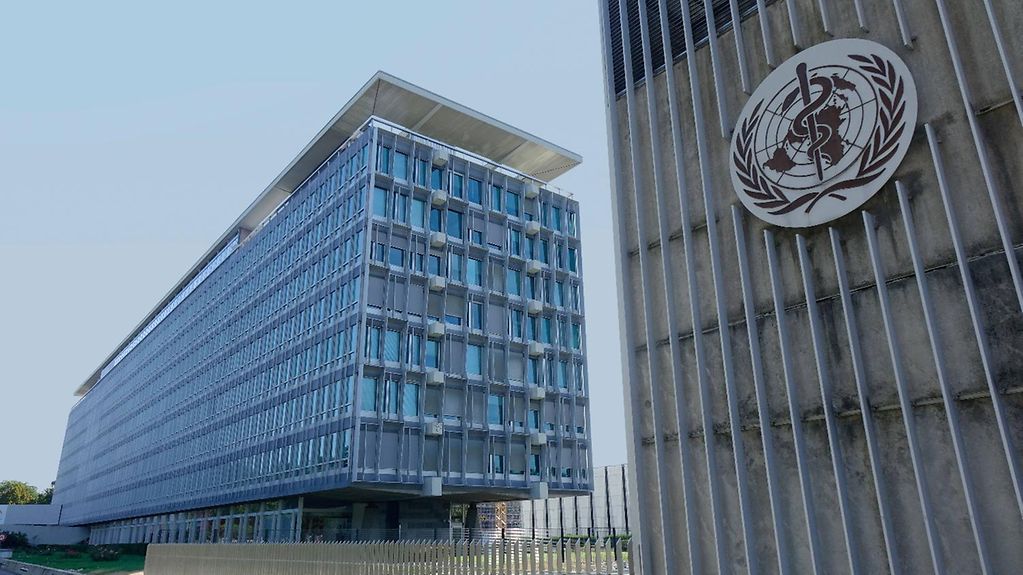World Health Organization
Viruses know no borders. Global health policy is thus in everybody’s best interests in an increasingly networked world. The most important player in this is the World Health Organization. What is its goal, and what is its mandate?
3 min reading time

The World Health Organization is based in Geneva. It was founded in 1948 to coordinate the international public health system.
Photo: imago images/Steinach
Since the World Health Organization (WHO) was founded on 7 April 1948, it has been working to build a better, healthier future for people all over the world.
Controlling outbreaks of diseases
Since it was founded, the WHO has endeavoured to strengthen national health systems. Universal access to medical care facilitates effective steps to control outbreaks of diseases such as Ebola or cholera, or currently COVID-19.
In an increasingly networked world, states and international organisations must respond jointly to health threats. The fact that viruses do not respect national borders was known well before the novel coronavirus began to spread.
Let us recall that the severe Ebola outbreak in West Africa in 2014/2015 was only stemmed thanks to global crisis management, coordinated by the WHO. The German government provided specialists and equipment to support the work of the WHO and non-governmental organisations like Médecins Sans Frontières (MSF) which were operating on the ground.
Vaccination a huge success
The fight against infectious diseases for which vaccines exist has been one of the major achievements of the WHO. Global vaccination programmes help prevent millions of children dying every year of infections, or surviving with a permanent disability.
Smallpox is a good example. At the end of 1979, the WHO declared that smallpox had been eradicated, following mass vaccination campaigns. A global smallpox vaccination was introduced in 1967. Where the disease occurred, all contacts were identified as swiftly as possible to prevent an outbreak.
The fight against polio is also successful. The WHO is coordinating the Global Polio Eradication Initiative. Polio has already been eradicated throughout Europe, but it is still found in other parts of the world. The incidence of new infections has dropped enormously, however. Only isolated cases of polio occur today. Nevertheless, it is important to continue to vaccinate consistently. This is the only way to prevent polio spreading again.
Voluntary contributions are becoming increasingly important
The WHO is financed by a mixture of assessed contributions (membership dues) and voluntary contributions. The assessed contribution of each country is calculated according to the country’s wealth and population. Germany, for instance, is required to contribute about 6.4 per cent of the WHO’s budget. For a two-year period, the 194 member states of the WHO must pay assessed contributions totalling a good billion US dollars.
The 2018/2019 two-year budget totalled about 4.4 billion US dollars, while the budget for 2020/2021 is a good 4.8 billion US dollars. This illustrates the fact that voluntary contributions outstrip the assessed contributions. Without these voluntary contributions, which come not only from states but also from major foundations, the WHO would not be able to perform a large part of its work.
Often voluntary contributions are tied to a special purpose or a particular field of activity of the WHO. The WHO’s Global Alliance for Vaccines and Immunization (GAVI), for instance, is financed in part as a public-private partnership, with the Bill and Melinda Gates Foundation putting up a large percentage of the funding.
WHO – a United Nations agency
The World Health Organization (WHO) was founded on 7 April 1948 as the United Nations agency to coordinate the international public health system. Today, the WHO has 194 member states.
The organisation is based in Geneva. It has a regional office in each of its six regions as well as more than 140 country offices. WHO employs more than 7,000 people around the globe
The World Health Assembly (WHA) is the WHO’s top decision-making body. Representatives of all 194 member states attend its annual meetings. Between World Health Assembly meetings, the organisation is managed by the Executive Board. It is composed of 34 persons, each designated by their respective government. Member states designating representatives are elected for three-year terms by the World Health Assembly.